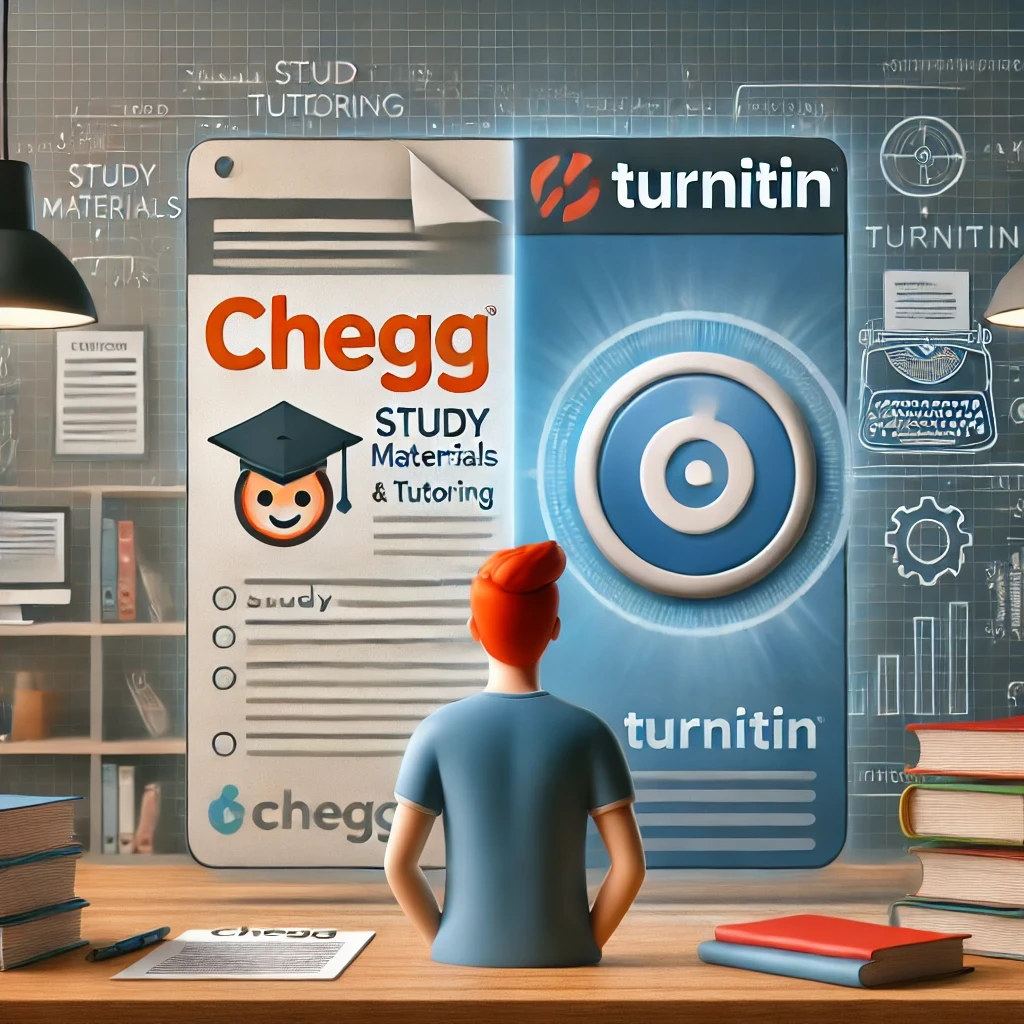As we all know it Chegg’s Plagiarism Checker is a popular tool for students who need a quick check. However, can it really go toe-to-toe with Turnitin? The short answer is NO. The longer answer is that the devil lies in the details. Keep reading to know more about it.
Why is Turnitin More Robust Than Chegg?
The simple answer is that Turnitin is built to serve academic institutions and integrates with Learning Management Systems (like Blackboard, Moodle, etc.), whereas Chegg is more of a standalone tool aimed at individual users. Turnitin hosts a huge database of billions of sources, academic papers from over 91 million students, and processes more than 1 million submissions daily. Meanwhile, Chegg’s database is relatively smaller, it generally won’t catch deep or advanced plagiarism.
Turnitin also uses sophisticated machine-learning algorithms to detect direct copying, paraphrased passages, and even ChatGPT-generated content (or other AI-based rewrites). Chegg uses simpler matching algorithms that work just fine for basic text checks, but about 1 in 1,000 unintentional plagiarism cases may slip through and not get flagged.
My Personal Experience with Turnitin vs. Chegg
Turnitin is much easier to use (once you have access) but you cannot just simply go and buy a subscription on their site. They only give access through academic institutions, which in turn pass it to their teachers or professors. I personally was able to get it from some sketchy sources which I won’t be telling to anyone.
I have also used Chegg’s Plagiarism Checker. Even though it is user-friendly, it is way inferior because it doesn’t have that huge database of academic papers or student’s past work. Also, Turnitin’s advanced reports with color-coded highlights and similarity percentages are far more comprehensive, letting you see exactly what text is tripping up the detection.
Pricing & Accessibility
Chegg costs around $9.95 per month, and they do offer a 3-day free trial. This subscription also comes with grammar and citation tools, which is a good bonus for students who just need quick checks and a bit of writing help. On the other hand, Turnitin’s pricing typically starts around $18.95 per month for institutional users, or roughly $3 per student annually in some universities. However, you cannot just sign up as an individual, which is a big stumbling block if your school doesn’t already use it.
Pros and Cons in a Nutshell
Chegg Plagiarism Checker
- Pros: Quick, straightforward, good for individual students on a budget, grammar correction that addresses over 200 types of errors, and you can get citation support.
- Cons: Smaller database, simpler algorithms, and no real integration with academic systems. It can miss subtle or nuanced plagiarism.
Turnitin
- Pros: Extensive database, super advanced technology, deeply integrated with educational platforms, and extremely accurate detection of direct copying and paraphrased text. It can even catch AI-generated content in many cases.
- Cons: It’s more expensive and only accessible through an academic institution. Privacy concerns may also arise because it stores papers in its large database.
Frequently Asked Questions
Q1. Does Turnitin detect Chegg’s Plagiarism Check?
Not exactly “detect” but Turnitin might show higher similarity if you previously ran your paper through Chegg. The big difference is that Turnitin has deeper checks against billions of sources. So Chegg’s check doesn’t necessarily reduce your Turnitin score much, but it might fail to catch some issues in the first place.
Q2. Is Chegg plagiarism checker the same as Turnitin?
No, not at all. Chegg’s Plagiarism Checker is designed mainly for individuals who want a quick, basic detection, whereas Turnitin is geared toward schools and universities with a far bigger database. Chegg might be good for a simple check, but Turnitin is built to handle advanced plagiarism cases and even detect paraphrased or AI-generated text.
Q3. Is Chegg Plagiarism Checker enough for academic papers?
If your institution uses Turnitin or a similar enterprise-level tool, then no, Chegg won’t suffice for a 100% safe overlap check. It’s good for a preliminary review, but it can’t match Turnitin’s thorough scanning.
Q4. Does Chegg count as plagiarism?
No, merely using Chegg doesn’t automatically count as plagiarism. However, copying answers or text directly from Chegg and presenting them as your own without proper citation would indeed be considered plagiarism. Always cite your sources and use Chegg as a study aid rather than a shortcut for submitting original work.
Q5. Can I just buy Turnitin Access as a student?
Usually, no. Turnitin deals with institutional licenses, not individual subscriptions. You’d need your school or professor to set it up for you.
Q6. Does Turnitin handle grammar checks too?
Turnitin does offer a wide range of feedback tools, including some grammar checking in their Feedback Studio. But it’s mostly known for its plagiarism detection. Chegg, on the other hand, includes grammar and citation features in its Writing Help membership.
Q7. What if I run my paper through both Chegg and Turnitin?
You could, but it might be overkill. Sometimes, Turnitin can detect that the paper was pre-checked or posted online. Also keep in mind, if you rely solely on Chegg first, you might still end up flagged by Turnitin later because Turnitin catches issues that Chegg might have missed.
The Bottom Line
If you’re a student on a tight budget who wants a quick plagiarism and grammar check, Chegg is a fine option with its affordable monthly plan and a 3-day free trial. But if you need the maximum accuracy and an in-depth originality report, especially if you are part of an institution, then Turnitin is hands down the superior choice, with a massive database and advanced machine learning to detect even subtle paraphrasing or AI-generated text.
In the end, it all arrives down to one fact: Chegg is simpler to access and cheaper, but Turnitin is the gold standard in plagiarism detection. Just keep in mind you can’t buy Turnitin individually. So, weigh your needs carefully. If you are serious about academic integrity and thorough plagiarism checks, turn to Turnitin (pun intended). If you just need a quick fix but can’t get Turnitin, Chegg will do the job, most of the time.



